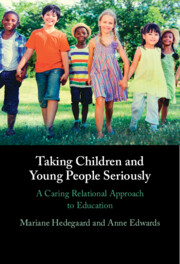Book contents
- Taking Children and Young People Seriously
- Taking Children and Young People Seriously
- Copyright page
- Contents
- Figures
- Tables
- Chapter 1 Taking Children and Young People Seriously
- Chapter 2 A Cultural-Historical Approach to Children’s Development and Childhood
- Chapter 3 Working Relationally with Other Professionals and Families
- Chapter 4 Very Young Children
- Chapter 5 Care and Education in Kindergarten with Play as the Core Activity
- Chapter 6 Engaging with Knowledge When Starting School
- Chapter 7 Caring Approaches to Pedagogy
- Chapter 8 The Primary School Age
- Chapter 9 Developmental Teaching as a Double Move between Subject Knowledge and Children’s Appropriation of Personal Knowledge
- Chapter 10 Adolescence and Transitions into Early Adulthood
- Chapter 11 A Caring Relational Approach to Education
- References
- Index
Chapter 7 - Caring Approaches to Pedagogy
Published online by Cambridge University Press: 08 June 2023
- Taking Children and Young People Seriously
- Taking Children and Young People Seriously
- Copyright page
- Contents
- Figures
- Tables
- Chapter 1 Taking Children and Young People Seriously
- Chapter 2 A Cultural-Historical Approach to Children’s Development and Childhood
- Chapter 3 Working Relationally with Other Professionals and Families
- Chapter 4 Very Young Children
- Chapter 5 Care and Education in Kindergarten with Play as the Core Activity
- Chapter 6 Engaging with Knowledge When Starting School
- Chapter 7 Caring Approaches to Pedagogy
- Chapter 8 The Primary School Age
- Chapter 9 Developmental Teaching as a Double Move between Subject Knowledge and Children’s Appropriation of Personal Knowledge
- Chapter 10 Adolescence and Transitions into Early Adulthood
- Chapter 11 A Caring Relational Approach to Education
- References
- Index
Summary
The chapter examines how children can be supported relationally and care-fully in their development as agentic learners at home and at school. Drawing on examples, we highlight the emotional aspects of learning and the role of motive orientation in engaging learners with powerful knowledge. We argue that, while affect is usually central to family relationships, practitioners will find the relational concepts of relational expertise, common knowledge and relational agency helpful when encouraging learners’ positive affective relationships with the environments that they provide in their professional settings. We introduce a cultural-historical model of a teaching and learning sequence, which aims at nurturing learner agency and their use of conceptual understandings in their actions on the world. The model is drawn on in subsequent chapters and highlights the changing role of teachers throughout the sequence of activities. The chapter also traces the work of cultural-historical theorists Galperin, Davydov and El’konin and the construction of developmental teaching taken forward by Davydov and Elkonin. How an understanding of a relational pedagogy can also enhance work on school inclusion is also discussed.
Keywords
- Type
- Chapter
- Information
- Taking Children and Young People SeriouslyA Caring Relational Approach to Education, pp. 147 - 169Publisher: Cambridge University PressPrint publication year: 2023



